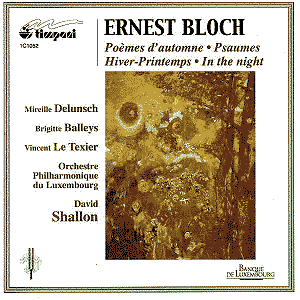|
|
Search MusicWeb Here |
|
 |
||
|
Founder:
Len Mullenger Editor
in Chief:John Quinn
|
|
|
Search MusicWeb Here |
|
 |
||
|
Founder:
Len Mullenger Editor
in Chief:John Quinn
|
 |
Ernest BLOCH
(1880-1959) Hiver-Printemps (1904-5) [14.29] Poèmes D’Automne (1906) [22.23] In the Night (1922) [5.17] 2 Psaumes (1912-14) [12.59] Psaume 22 (1913-14) [7.54] Brigitte Balleys (mezzo-soprano) Vincent Le Texier (baritone) Orchestre Philharmonique de Luxembourg/David Shallon Recorded at Luxembourg Conservatoire, September, 1999 DDD |
| CD available for post-free online mail-order or you may download individual tracks. For some labels you can download the entire CD with a single click and make HUGE savings. The price you see is the price you pay! The full booklet notes are available on-line. | |
|
NOTE • Click on the button and you can buy the disc or read the booklet details • You can also access each track which you may then sample or down load. • Further Information. |
|
|
The excellent Timpani label continues to explore neglected, but worthwhile, repertoire with this recent(ish) release devoted to the music of an overtly Jewish artist, a ‘composer in search of a country’, Ernest Bloch. Though he eventually found a stability (of sorts) in the USA, all the works on this disc, with the exception of the very short In the Night, come from Bloch’s first major creative period, prior to the First World War.
I think it is fair to assume that, to the average listener, Bloch is really only known for his famous ‘Hebraic rhapsody’ for cello and orchestra, Schelomo, as well as possibly the Violin Concerto (in Menuhin’s famous recording), and Baal Shem, another piece featuring solo violin and often coupled with either of these two works. The present disc proudly announces ‘premieres’ on the cover, and certainly if you respond to any of the more familiar Bloch, you will enjoy making the acquaintance of all these pieces.
Although the liner note writer, Harry Halbreich, rightly defines Bloch as ‘a fiercely independent composer on the fringes of the twentieth century’s aesthetic movements, who deliberately chose solitude as the only means of staying faithful to his ideal’, there are discernible traces of other composers here. The orchestral diptych Hiver-Printemps (Winter-Spring), which the composer himself premiered in Paris in 1906, has echoes of Debussy, not least in the fragmented nature of the melodic line, which is shared out between families of instruments, the whole thing having a suitably Impressionistic blur. The Poèmes D’Automne, written while Bloch was going through something of a personal crisis, are settings of four poems by his then lover, Beatrix Rodes; the words themselves are rather naïve and dated (even by the standards of 1906), but Bloch’s music has real power and imagination, emerging as a sort of cross between Strauss and Ravel. The most opulent orchestral sonorities are saved for the last setting, Invocation, where lines such as ‘the flames are mounting toward the leaves aglow on the branches’ are saved by a sumptuous bed of sound, rich in string tone and evocative woodwind detail.
Bloch’s setting of Psalms 114 and 137 have invited comparisons with the precocious Lili Boulanger, whose settings of Psalms 24 and 130 (also recorded by Timpani) share a similarly grand and visionary quality. The two composers are not known to have met, but there is something about the fervent word-painting, tinged with dissonance (an awareness of Stravinsky creeping in?) that almost compel one to draw parallels. Whatever the case, this is Bloch inspired by his text, creating a vivid picture of suffering and salvation, superbly performed (as are all the pieces) by singers and orchestra alike.
This is all music that is well worth getting to know; Bloch was a great craftsman and, at his best, a creator of memorable material. He was working through turbulent times, artistically and politically, and whilst traces of more famous composers are inevitable, Bloch is always his own man. He is famously quoted thus; "I readily confess I have never sought to be original or ‘modern’ in any of my works … theories, like novelties, come and go so quickly … my sole effort has been directed towards being faithful to my vision, towards being true … Art for me is an expression of life, not a cold-headed elaboration of mathematical theory’. The works recorded here amply justify this aesthetic, and could not be more persuasively performed. The orchestra play with real sensitivity and, where needed, sumptuous virtuosity, and all the soloists are first-rate. Recorded sound is also good, with plenty of bloom, a spacious acoustic, and balance between soloists and ensemble well judged.
An excellent disc, then, which not only fleshes out our knowledge of music at the turn of the century, but widens our appreciation of a gifted composer. Tony Haywood See also review by Rob Barnett
|
| ADDITIONAL INFORMATION •
You can sample only 30 seconds (or 15% if that is longer) of a given track. Select from the View tracks list. Each sample will normally start from the beginning but you can drag the slider to any position before pressing play. • PLEASE NOTE: If you are behind a firewall and the sound is prematurely terminated you may need to register Ludwig as a trusted source with your firewall software.
•You will need Quicktime to hear sound samples. Get a free Quicktime download here • If you cannot see the "Sample All Tracks" button you need to download Flash from here.
|
|
|
Return to Index |